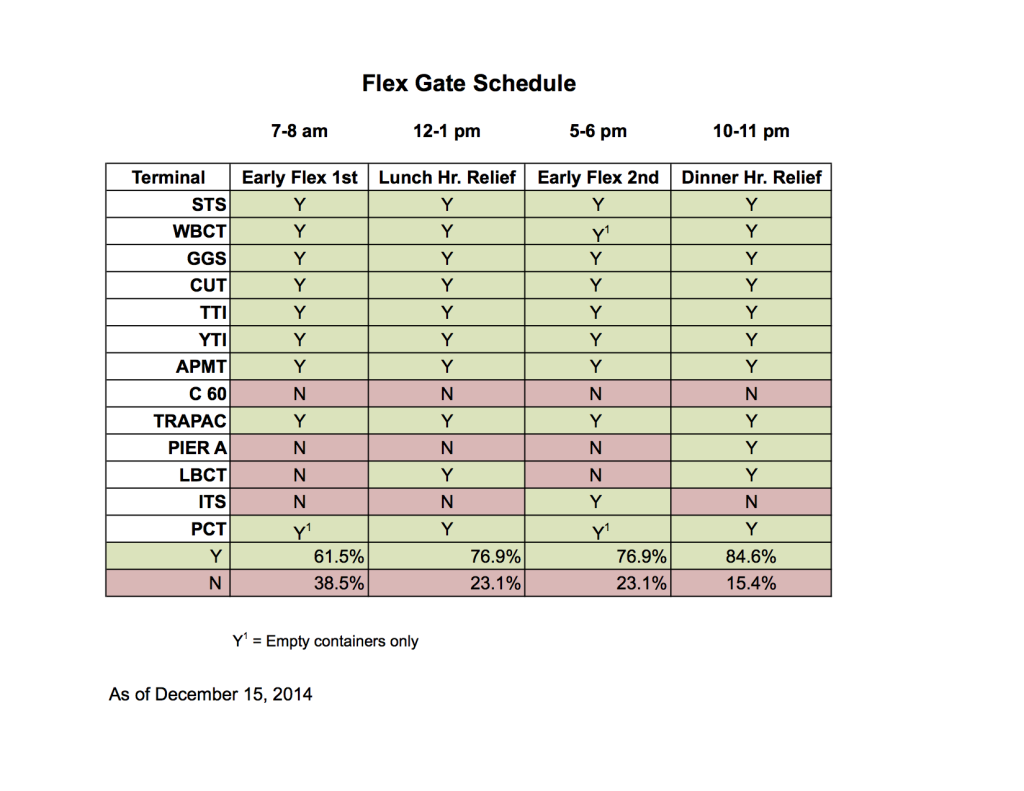PierPass September News and Updates
One year ago, the Ports of Los Angeles and Long Beach were entering a period of severe congestion. As we reach the height of this year’s peak season, cargo is flowing much more smoothly through the 13 member container terminals of PierPass.
There is no line of ships stacked up in the harbor waiting to dock. Container dwell time (the time an import container waits to be picked up) is down to about three days from five to six last fall. In-terminal truck turn times for single transactions, while up slightly in August, remain well below the peak of 61 minutes in November 2014.
Terminal yards have enough open yard space to operate normally; one large terminal operator puts the “utilization” rate – the percentage of yard space occupied by container stacks – at a normal 70%, down from more than 95% last winter.
The worst of the congestion was over by late February, when cargo throughput snapped back sharply after the labor deal was reached on February 20. While conditions often tighten up during the peak season as retailers prepare for the holidays, 2015 has seen no seasonal increase in congestion.
This isn’t to say all issues have been resolved. While chassis availability has improved since the leasing companies formed a “pool of pools” in March, chassis shortages remain an ongoing concern. PierPass and its member container terminals, along with other stakeholders at the Ports of Los Angeles and Long Beach Supply Chain Optimization meeting recently identified chassis, and in particular lengthy street dwell times, as the issue that could bring the ports back into a state of congestion.
With larger ships arriving and cargo volumes once again approaching their 2006 peak, the goods movement industry needs to continue innovating new methods to move cargo more quickly. The terminals, among other steps, are increasingly moving toward appointment systems to spread out truck arrivals, and continue working with stakeholders to increase the use of the “free flow” process to rapidly deliver stacks of containers to a single owner or trucking company.
PierPass Monthly Transaction Data
Each month we provide a summary of the latest transaction data from marine terminal operators (MTOs) at the Port of Los Angeles and Port of Long Beach. Below please find data from the month of August 2015.
Average in-terminal turn time:
49.2 minutes day shift
51.4 minutes night shift
For comparison, the average in-terminal turn time in July 2015 was 48.1 minutes for the day shift and 49.2 minutes for the night shift.
In-terminal turn time is the average amount of time a truck is inside a terminal to complete a transaction. Truck activity information is derived from RFID data, and excludes lunch hour, breaks and trouble tickets. Turn time at individual terminals will vary depending on time of day and other factors. For more information about turn times and how we measure them, please see our Q&A at http://goo.gl/PiOjBp.
Average daily moves per truck for frequent callers* in August:
5 or moves per day: 8%
4 moves per day: 14%
3 moves per day: 29%
2 moves per day: 32%
1 move per day: 17%
*The ports define frequent callers as trucks making one or more moves per weekday. Average moves per day by frequent callers tells us how many moves a truck can make if it is working every day. In August, 22% of frequent callers made four or more moves per day.
Gate moves during Peak and OffPeak/exempt shifts in August:
Total Peak gate moves: 381,694 (56%)
Total OffPeak/Exempt gate moves: 302,979 (44%)
The number of unique trucks calling on the ports in August was 12,395.
A gate move occurs when a container enters or leaves a marine terminal via the truck gates. Peak shifts are Monday through Friday, 8:00 a.m. to 5:00 p.m. OffPeak shifts are Monday through Friday, 6:00 p.m. to 3:00 a.m., and Saturday 8:00 a.m. to 5:00 p.m. Saturday night and Sunday shifts, which are not regularly scheduled, are considered “exempt.”
Note:
Terminals were closed for the OffPeak shift on August 6 for an ILWU Stop Work meeting.
To learn what it takes for a truck to drop off or pick up a container at a marine terminal, please see http://youtu.be/P9IJN1yIIJ4.

